The University of Oxford’s Faculty of Law invited Donald Nordberg, Associate Professor in the BU Faculty of Management, to contribute a commentary to the widely read Oxford Business Law Blog. The piece is an essay concerning the creation of the Cadbury Code on corporate governance 25 years ago, and its subsequent revisions, and then pointing to questions about its continuing validity in the wake of the global financial crisis and changes in the investment landscape. The essay summarises his working paper, posted on Social Sciences Research Network, which reviews the nature of the debate over one key and recurrent issue: whether the UK should adopt something like the two-tier boards of directors common across continental Europe.
BU Faculty of Management, to contribute a commentary to the widely read Oxford Business Law Blog. The piece is an essay concerning the creation of the Cadbury Code on corporate governance 25 years ago, and its subsequent revisions, and then pointing to questions about its continuing validity in the wake of the global financial crisis and changes in the investment landscape. The essay summarises his working paper, posted on Social Sciences Research Network, which reviews the nature of the debate over one key and recurrent issue: whether the UK should adopt something like the two-tier boards of directors common across continental Europe.
Yearly Archives / 2017
The International Early Labour Research Group
Researchers from across the globe met in Canada prior to the International Confederation of Midwives’ 31st Triennial Congress to discuss their work on early labour.
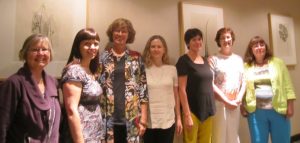
r-l: Dr. Susan Way, UK; Prof. Vanora Hundley, UK; Dr. Mechthild Gross, Germany; Dr. Ellen Tilden, USA; Dr. Jessica Pehlke-Milde, Switzerland; Prof. Helen Spiby, UK; Prof Patricia Janssen, Canada
Other members (not present): Prof. Helen Cheyne, Dr. Mary-Ann Davey, Marie Nott, Viola Nyman
The International Early Labour Research Group has been meeting regularly since 2008 and produced a number of collaborative papers. Most recently a systematic review of labour definitions. This meeting was a chance to catch up on ongoing work, introduce new members and plan a future follow up survey on the latent phase of labour.
The Triennial Congress attracts midwives from all over the world. In 2017 there are over 4000 midwives, policy makers, donors, civil society and government representatives from 116 midwifery associations and representing 102 countries.
Dr Susan Way and Professor Vanora Hundley
Maternal mental health in Nepal ICM presentation
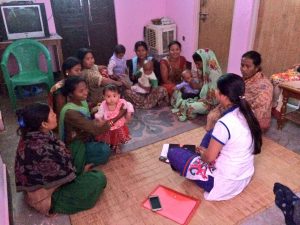 As promised to our audience at the 31st International Confederation of Midwifery Triennial Congress in Toronto today: the slides used on our session ‘Mental health training for community maternity workers in Nepal. The slides in PDF format can be accessed here: Nepal THET ICM 2017. Our project brought together academics, midwives, nurses, and other health workers in Nepal and the UK to help in the training of Auxiliary Nurse Midwives in Nawalparasi on key aspects of mental health and mental health promotion. The project led by Bournemouth University was funded under the Health Partnership Scheme (HPS) which is managed by a London-based organisation called THET (Tropical Health & Education Trust).
As promised to our audience at the 31st International Confederation of Midwifery Triennial Congress in Toronto today: the slides used on our session ‘Mental health training for community maternity workers in Nepal. The slides in PDF format can be accessed here: Nepal THET ICM 2017. Our project brought together academics, midwives, nurses, and other health workers in Nepal and the UK to help in the training of Auxiliary Nurse Midwives in Nawalparasi on key aspects of mental health and mental health promotion. The project led by Bournemouth University was funded under the Health Partnership Scheme (HPS) which is managed by a London-based organisation called THET (Tropical Health & Education Trust).
Can I also take the opportunity to list all our collaborators in Nepal and UK:
Padam Simkhada, Bhimsen Devkota, Shyam K. Maharjan, Lokendra Sherchan, Ram Chandra Silwal, Krishna Acharya, Bishnu G.C., Ram K. Maharjan, Bibha Simkhada, Jillian Ireland, Jane Stephens, Colette Fanning, Edwin van Teijlingen, Geeta Sharma, Samridhi Pradhan, Seam MacKay, Ish Fawcett, Andrea Lawrie, Dave Havelock, Liz Murphy, Rose Pringle, Sapana Bista, Chrissy Reeves & Flora Douglas.
Prof. Edwin van Teijlingen
Centre for Midwifery, Maternal & Perinatal Health
Review published on BU co-edited academic book
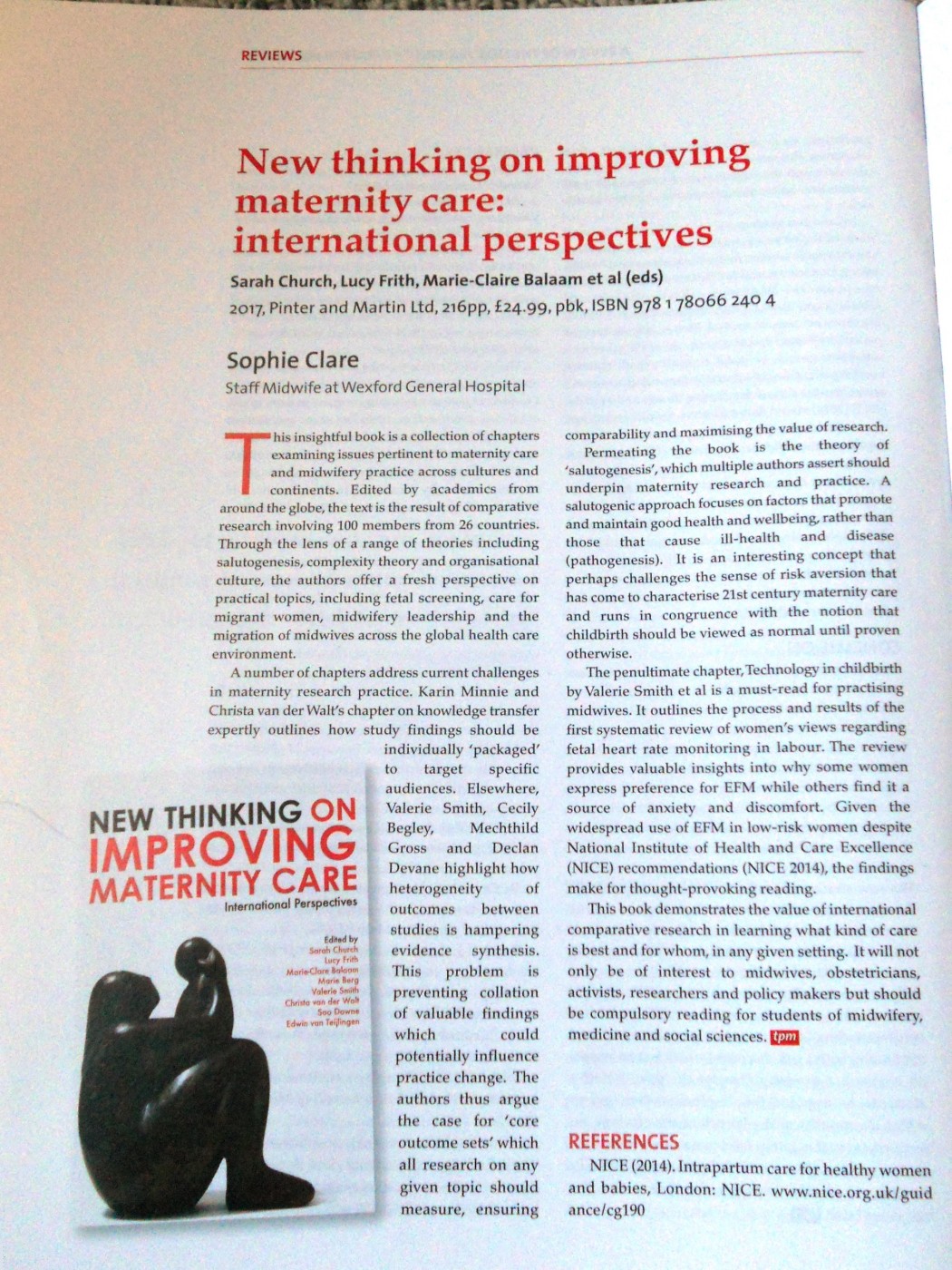 Sometimes we use the BU Research Blog to report on our own research and publications, sometimes post blogs about the works of colleagues. Occasionally we have the pleasure to report on something written about, or in reply to, our own studies. This book review in The Practising Midwife [1] falls in the latter category as it reviews our recently published edited volume New Thinking on Improving Maternity Care: International Perspectives. This volume is edited by academic from across the varies countries [2]. The book is the result of years of comparative international research, funded by the EU (European Union) through its COST Action. The book sets out to generate the best possible evidence across a range of childbirth practices, contexts, and issues in Europe (and beyond).
Sometimes we use the BU Research Blog to report on our own research and publications, sometimes post blogs about the works of colleagues. Occasionally we have the pleasure to report on something written about, or in reply to, our own studies. This book review in The Practising Midwife [1] falls in the latter category as it reviews our recently published edited volume New Thinking on Improving Maternity Care: International Perspectives. This volume is edited by academic from across the varies countries [2]. The book is the result of years of comparative international research, funded by the EU (European Union) through its COST Action. The book sets out to generate the best possible evidence across a range of childbirth practices, contexts, and issues in Europe (and beyond). 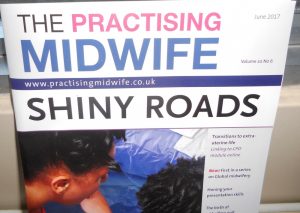
The reviewer is Sophie Clare a Staff Midwife at Wexford General Hospital finds it an insightful book which is “a collection of chapters examining issues pertinent to maternity care and midwifery practice across cultures and continents.” She concludes that our book “demonstrates the value of international comparative research in learning what kind of care is best and for whom, in any given setting.”
Professor Edwin van Teijlingen
Centre for Midwifery, Maternal & Perinatal Health
References:
- Clare, S. (2017) New Thinking on Improving Maternity Care: International Perspectives, Sarah Church, Lucy Firth, Marie-Claire Balaam et al (ads) 2017, Pinter and Martin Ltd, 216pp, £24.99, pbk, ISBN 978 178066 240 4 [book review], The Practising Midwife 20(6):36.
- Church, C., Firth, L., Balaam, M-C., Berg, M., Smith, V., van der Walt, C., Downe, S., van Teijlingen, E. (Eds.) (2017) New Thinking on Improving Maternity Care: International Perspectives, London: Pinter & Martin
BU posters at international midwifery conference
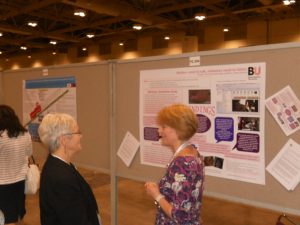 BU academics from the Faculty of Health & Social Sciences had a strong presence at the International Confederation of Midwives (ICM) in Canada this lunch time. They presented four separate academic posters today at the ICM conference in Toronto. First, Dr. Alison Taylor presented her poster ‘Mothers need to talk, midwives need to listen: Insights from breastfeeding mother’s video diaries’. Secondly, Sara Stride and Dr. Sue Way presented their poster on ‘UUPP Study: Updating the Understanding of Perineal Practice at the time of birth across the United Kingdom’.
BU academics from the Faculty of Health & Social Sciences had a strong presence at the International Confederation of Midwives (ICM) in Canada this lunch time. They presented four separate academic posters today at the ICM conference in Toronto. First, Dr. Alison Taylor presented her poster ‘Mothers need to talk, midwives need to listen: Insights from breastfeeding mother’s video diaries’. Secondly, Sara Stride and Dr. Sue Way presented their poster on ‘UUPP Study: Updating the Understanding of Perineal Practice at the time of birth across the United Kingdom’.
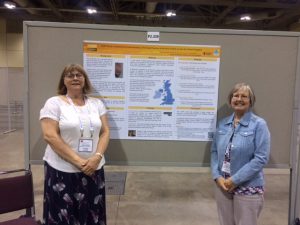 Prof. Vanora Hundley, Dr. Ann Luce (BU Faculty of Media & Communication), Prof. Edwin van Teijlingen and two students, Sofie Edlund and Sian Ridden also presented their poster on ‘Changing the narrative around birth: midwives’ views of working with the media’.
Prof. Vanora Hundley, Dr. Ann Luce (BU Faculty of Media & Communication), Prof. Edwin van Teijlingen and two students, Sofie Edlund and Sian Ridden also presented their poster on ‘Changing the narrative around birth: midwives’ views of working with the media’. 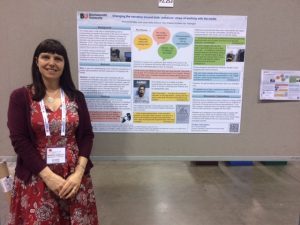
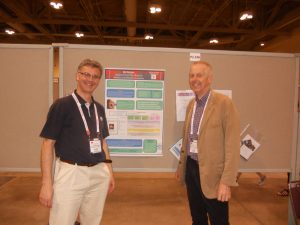 And, last but not least, Prof. Vanora Hundley and Prof. Edwin van Teijlingen also contributed to a poster produced by Dr. Andrew Symon and colleagues from across the UK: ‘Midwifery-led antenatal care models: Mapping a systematic review to an evidence-based quality framework to identify key components and characteristics of care’.
And, last but not least, Prof. Vanora Hundley and Prof. Edwin van Teijlingen also contributed to a poster produced by Dr. Andrew Symon and colleagues from across the UK: ‘Midwifery-led antenatal care models: Mapping a systematic review to an evidence-based quality framework to identify key components and characteristics of care’.
ESRC Transformative Research Call: internal competition 2017
 The ESRC expects universities to exercise demand management and pre-select applications for the ESRC Transformative Research Call 2017-18. The value of the grant is up to £250K (at 100% fEC) over a maximum of two years.
The ESRC expects universities to exercise demand management and pre-select applications for the ESRC Transformative Research Call 2017-18. The value of the grant is up to £250K (at 100% fEC) over a maximum of two years.
The aim of this call is to provide a stimulus for social science research that is novel, pioneering and genuinely transformative. Ideas should challenge current thinking and contain an element of academic risk.
Only two applications may be submitted by Bournemouth University and therefore a special panel has been convened. Colleagues wishing to submit an application to this call should adhere to the following time scale:
| July 18th | Deadline- Send Intention to Bid form to the Funding Development Officer for your faculty |
| July 31st | Call Opens- applicants must work with a Faculty peer reviewer and follow submission approval processes at the Faculty level as guided by your Funding Development Officer |
| August 29th | Final draft application to be submitted to Dianne Goodman (dgoodman@bournemouth.ac.uk) for collating on behalf of the internal review panel |
| September 5th | PVC (R&I) and other panel members to decide the two applications that may submit on behalf of BU. PVC to provide BU financial (Activity Proposal Form) sign off for two applications |
| October 23rd | Final submission must be submitted via JeS for institutional checks and submission |
| October 31st at 16:00 | ESRC deadline- Call closes – proposals meeting funder requirements submitted |
If you have any queries, please contact Ehren Milner (emilner@bournemouth.ac.uk).
Marie Skłodowska-Curie Action Individual Fellowship – Bid Writing Retreat
As the European Commission celebrates the support of over 100,000 researchers through Marie Skłodowska-Curie Actions, RKEO are pleased to update our arrangements for supporting this high profile call in 2017.
 Support
Support
- There will be a two-day bid writing retreat on 5th and 6th July, with bookings now open
- Materials are already available on the MyBU Research & Knowledge Exchange Development Framework Community
- External bid writing support, where appropriate
Timeline
As this is a highly popular call, RKEO need to carefully manage the flow of work within RKEO but also for all your colleagues, who work together, to ensure that each application is approved and submitted correctly.

Please ensure that the Intention to Bid is submitted to RKEO by 30/06/17. You can, of course, let us know earlier than this date that you intend to apply, so that we can provide you, and your potential fellow, with as much support as possible, right up to the closing date of 14/09/17. It is expected that early drafts will be sent to RKEO at the beginning of August, allowing time for all those involved to manage their workloads.
Communication
Once we know that you are thinking of applying, we can keep you up to date with announcements from the funder and other sources of help and support.
If you are considering applying and would like to receive updates, please contact Sara Mundy, who is acting as the RKEO’s central contact for the administration of the 2017 submission, so that we can register your interest. If you are ready to submit your Intention to Bid, you can do this now, via Sara.
If you have any queries or comments about this scheme, please contact Emily Cieciura, RKEO’s Research Facilitator: EU & International
Poster presentation Dr Alison Taylor at ICM conference
 Dr. Alison Taylor of the Centre for Midwifery, Maternal & Perinatal Health (CMMPH) presented her poster today on breastfeeding on the first day of the International Confederation of Midwives (ICM) conference. Alison’s poster ‘Early breastfeeding support for first-time UK mothers: A study based on video diaries’ was well received in Toronto (Canada).
Dr. Alison Taylor of the Centre for Midwifery, Maternal & Perinatal Health (CMMPH) presented her poster today on breastfeeding on the first day of the International Confederation of Midwives (ICM) conference. Alison’s poster ‘Early breastfeeding support for first-time UK mothers: A study based on video diaries’ was well received in Toronto (Canada).
The ICMLive produces webcasts of some of the major conference. This week you can watch events live here.
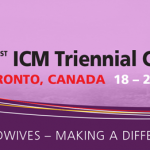
Professors Vanora Hundley and Edwin van Teijlingen
CMMPH
BU academics publish UK election report within 10 days of vote
Sandcastles, trivialising science?
Most scientists agree that we have an image problem. This is serious at a time when research is at a premium to inform decision-making as argued so beautifully by Mark Henderson in The Geek Manifesto. We have a new generation of skilled science communicators on television today like Brian Cox, Jim Al Kalil, Alice Roberts and Iain Stewart to name but four and the quality and availability of science reporting has increased dramatically with the digital age. But the focus remains on discovery, the easy or sexy headline and therefore often on the trivial. Complex more nuanced, incremental stories are more often than not ignored. Every publically funded researcher is under pressure to engage the public and to increasingly justify what they do as part of the social contract with the public which funds them. For example, almost all funding in the UK requires statements now about pathways to engagement, but with this focus there is an ever present risk of simply pandering to the trivial and the easy as researchers seek publicity. It is something that I have been accused of myself.
The month of June is here which means for me the inevitable phone call to write something about building the perfect sandcastle. Professor Sandcastle, or the Sandcastle Boffin, was born in the summer of 2004 when I innocently became involved in a bit of summer ‘fluff’ for a holiday company. They wanted a formula for the perfect sandcastle. I obliged and the result caused a small unexpected media frenzy. The formula made it into the tabloids, was reported across the broadsheets and was a perfect regional story for radio and local television that summer. Much to my embarrassment I found myself portrayed as the Sandcastle Boffin. All was light hearted except for a barbed comment in the Independent, my newspaper of choice at the time, which cut deep: ‘haven’t they got anything better to do?’ ‘Yes of course I have, but you’re not interested in what I normally do’ I might have replied. The barb of triviality stuck fast.
The thing about the sandcastle story is that it would not die, despite the fact that the original research was never worthy in my view at least of publication. The following May I started to receive messages ‘we were so impressed by what you did for sandcastles last year can you . . .’ I was asked to create equations for love, happiness and luck. I turned most of them down but the idea of the ‘science equation as a’ tool was firmly embedded in a new generation of PR consultants. An appearance on the BBC Coasts programme with a linked session at the Cheltenham Science Festival helped cement the sandcastle connection, along with a slow but steady request for articles and radio interviews over the years. Most summers don’t pass without a request of some sort, nor has this one [http://theconversation.com/how-to-build-the-perfect-sandcastle-according-to-science-79600].
I have always delivered something when requested, seeing it as part of my remit as a modern academic to engage with the public slipping in messages about geology and earth history at every turn. I have resisted feelings of rancour when my real research has got less publicity remaining for the most part philosophical; if the public want fluff let them have it, better something than nothing, right? In truth it has done me no harm. The original interest gave me media training like no other and BU likes to remind people of its golden sands. It helped me as an academic appreciate the power and pitfalls of the media and the need for the sound bite and money shot in presenting more serious and challenging stories. Despite this the barb still twists; I am not just trivialising my academic discipline of sedimentology that I care deeply about? Is this not an ever present risk as we strive as academics for more public engagement? It is easy for us to write into funding pitches that we will do school events, give popular talks, create websites, attend and run festivals but does this really engage the public in the value and power of research? Are we not just feeding the media-machine with yet more trivia in lip-service to our funding aims? I have no idea whether my work on the perfect sandcastle over the years has made any real difference, it is impossible to quantify in terms of output. The truth is that measuring the consequences of engagement is hard and often undertaken post hoc. I am left without the answers but a gut feeling that is it better to show that science is all around us even in the humble sandcastle however trivial this may seem, than simply sit aloof concerned only about the more serious science stories that we may occasionally have to peddle.
How to build the perfect sandcastle – according to science
Whether we prefer water sports or relaxing with a good book, the humble sandcastle is often a seaside must. But what’s the secret to building a majestic sandcastle that will withstand the tide of time? Luckily, there’s a scientific formula for that.
It all started back in 2004, when a holiday company asked us to investigate the question. As a sedimentologist, someone who studies fragments of rock, I began pondering what kind of beach would work best for castle building. To find out, I compared the sand from the ten most popular beaches in the UK at the time. Though in truth any sandy beach will do, Torquay came out top with its delightful red sand, closely followed by Bridlington, with Bournemouth, Great Yarmouth and Tenby tied in third. At the bottom of the league was Rhyl.
Having selected a beach one has to find the perfect spot. Now this is a question of taste rather than hard rules. Some might prefer a spot close to the car park with easy access when the rain arrives while others might want to stay next to a cafe. Others yet might hanker after the secluded fringes of the beach, perhaps sheltered by natural promontories of rock that keep the biting wind at bay.

averoxus/wikipedia, CC BY-SA
Now a castle should be a symbol of military strength, but to stand proud one needs strong sand. The strength of sand depends on the properties of its individual grains and on the water between them. The more angular the grains, the better they will lock together. The more a grain is transported the more rounded it becomes. Microscopic shell fragments work well in this regard. The finer the grains the more they hold the water. And water matters.
Too much water and your sand will flow, too little and it will crumble. You need to get it just right and your castle will stand proud and last. It’s all down to the surface tension of water – the thing that gives the “meniscus”, or skin, to a glass of water and holds down that glass when placed on a wet bar top. The film of water between individual sand grains is what gives sand its strength, too much and it lubricates one grain over the other, but just right and it binds them strong.
The magic formula
Now the experimentation we did suggested that the perfect sandcastle requires one bucket of water to eight buckets of dry sand. Or if you want the magic formula: Water = 0.125 x Sand. So assuming that you don’t have any science gear with you, then you are looking for a spot close to the high tide line – usually marked by a line of seaweed and flotsam – and the low tide line where sand is still visibly wet and the waves are close. But remember that this will change as the tide comes and goes during the day.

My next tip refers to quality of your tools. In my experience there is a direct correlation between the age of the builder, spade size and the speed at which boredom sets in. Adult helpers find the smallest spade nothing but frustrating, and while young assistants might aspire to use the biggest spade, it is often too big to handle. A selection of tools will keep the workforce in harmony. The bucket also has to be the perfect size and shape. The best buckets are the simple round ones – not the ones with the fancy turrets which when turned out produce a castle in itself. A round bucket will allow you turn out countless towers and architectural features. A single bucket can be turned out several times to create a large mound from which you carve an amazing tower.
As you build, spare a thought to the story, not just of the castle one is building with its tales of derring-do, but also the story of the sand itself. Each grain is a fragment of rock and contains a story of relict mountains, ancient rivers, dinosaur-infested swamps and seas, of past climates and events which tell the amazing story of our planet. The red sand of Torquay once blew in giant sandstorms, as the area was once part of a desert far greater than that of the Sahara. The sand at Bridlington or Great Yarmouth tells a tale of giant ice sheets and drowned lands below the North Sea.
![]() My next tip refers to size. Yes, size matters – at least in the game of sandcastles. The modest castle with perfect towers, battlements and moat is ok, but it is the huge castles which break the beach horizon that inspire awe and wonderment in people that pass by. Think big! Pebbles, shells, driftwood fragments and feathers all enhance a castle. And let’s face it: a castle is about being seen. And although there may be science behind the humble sandcastle, don’t forget to have fun building it.
My next tip refers to size. Yes, size matters – at least in the game of sandcastles. The modest castle with perfect towers, battlements and moat is ok, but it is the huge castles which break the beach horizon that inspire awe and wonderment in people that pass by. Think big! Pebbles, shells, driftwood fragments and feathers all enhance a castle. And let’s face it: a castle is about being seen. And although there may be science behind the humble sandcastle, don’t forget to have fun building it.
Matthew Robert Bennett, Professor of Environmental and Geographical Sciences, Bournemouth University
This article was originally published on The Conversation. Read the original article.
Photo of the Week: Cretan Sea Submarine 4236
Cretan Sea Submarine 4236
Our next instalment of the ‘Photo of the Week’ series features Rutherford’s image from his ongoing project entitled Submarines. The series is a weekly instalment which features an image produced by our fantastic BU staff and students. The photos give a glimpse into some of the fascinating work our researchers have been doing across BU and the wider community.
“Over more than thirty years of commercial and fine art photographic practice, I have often noticed remarkable disparities between the scenes, objects, events or moments ‘out there’ I had attempted to record – and the content of the resulting photographs. These sometimes subtle, sometimes drastic, and often unanticipated disparities between what I had seen and what the photograph shows me seem to be the result of significant differences between the ways in which we experience time and space – and the way in which the camera renders them,”
“My research investigates two inter-related notions; Whether the camera sometimes records scenes, events and moments that did not exist ‘out there’ but which were instead created by the act of photographing them and, to what extent our ability to recognise this phenomenon is impeded by the ontological and epistemological assumptions inherent within the language we use to describe what photographs ‘are’ and what they show us – for example, by describing (and thereby reinforcing the idea that) photographs are ‘taken’ rather than ‘made’”, explains Rutherford.
If you’d like find out more about the research or the photo itself then please contact Rutherford.
Or please visit Rutherford’s website: http://www.theshadowofthephotographer.co.uk/
This photo was originally an entry to the 2017 Research Photography Competition. If you have any other questions about the Photo of the Week series or the competition please email research@bournemouth.ac.uk.
Grants Workshop 29th June – last chance to book

As part of the Research and Knowledge Exchange Development Framework, RKEO are hosting a Grants Workshop and follow-up Bid Writing Retreat.
This two day event will combine advice and guidance on writing grant applications, and will be delivered by external bid writing experts ThinkWrite.
Day one (Thursday, 29th June 2017) will comprise of a grants workshop which will give participants the opportunity to expand their ideas on available funding sources, and investigate what funders want to achieve when they hand over money. Participants will then develop a strategic approach to writing applications.
Day two (Monday, 24th July 2017) will consist of a follow-up bid writing retreat, where one-to-one support will be available to develop applications for funding.
All academics and researchers are welcome to attend. Participants can attend either day, but must have a funding application they plan to submit within 12 months. The application can be to any funder.
Places are limited, so book now to avoid disappointment. For more information and to book your space please see the RKE Development Framework page for this event.
For any other queries please contact Lisa Gale-Andrews, RKEO Research Facilitator.
Approaching the Case for Support – Last chance to book

As part of the Research and Knowledge Exchange Development Framework, RKEO are hosting a session on ‘Approaching the Case for Support’.
This interactive morning session will provide an overview of RCUK funding, and an overview of the anatomy of a proposal before detailing approaches to tackling the case for support, with the aim of increasing the likelihood of receiving funding. There will be an opportunity to gain feedback from the external facilitator, on the day and subsequently.
All academics and researchers are welcome to attend, but as places are limited we ask that participants have a funding application they plan to submit within 12 months. The application can be to any funder.
Date: Tuesday 27th June 2017
Time: 09:30-12:30
Venue: Talbot Campus
For more information and to book your space please see the RKE Development Framework page for this event.
For any other queries please contact Lisa Gale-Andrews, RKEO Research Facilitator.
ESRC-AHRC Migration Leadership Team
 The ESRC and AHRC are inviting proposals for a Migration Leadership Team to provide intellectual leadership for, and maximise the impact of, their combined migration research portfolio.
The ESRC and AHRC are inviting proposals for a Migration Leadership Team to provide intellectual leadership for, and maximise the impact of, their combined migration research portfolio.
This is a complex and wide-ranging portfolio, and they anticipate that the appointment will involve a collaboration of two or more individuals bringing complementary senior level expertise in this area. The team will play a vital role in:
- providing strategic and intellectual leadership over ESRC and AHRC’s existing migration research portfolio: mapping, curating and synthesising the portfolio in ways that should maximise potential impact on policy agendas, identifying synergies between existing investments and strategic gaps to support the development of a cohesive portfolio
- liaising with academics working in this and related fields, connecting and communicating with users, generating evidence and maximising the impact of the portfolio’s policy agenda through engagement with a range of policymakers and stakeholders both in the UK and internationally
- establishing and exploiting connections with other major migration research programmes and activities in Europe, in the developing world, and elsewhere
- identifying and advising on opportunities to develop the portfolio through future interdisciplinary activities including international collaboration under the broad theme of migration.
Applications must be submitted through the Je-S system by 16:00 on 8 August 2017.
The appointment is for 24 months in the first instance with the possibility to extend beyond the initial period of funding. The successful team should take up the post on 1 November 2017.
The maximum funding available is £500,000 fEC (full economic cost). In accordance with RCUK policy, the AHRC and ESRC will contribute up to 80% of fEC. This budget is expected to cover the Leadership Team’s salary costs, additional research salary costs, any support staff, as well as networking, travel, dissemination, knowledge exchange and impact activities.
Call documents
If you are interested in applying then please contact your RKEO Funding Development Officer in the first instance.
BU Senior Academic in Events Management Presents at Sussex Impact Day

Images from the Capturing Event Impacts presented by Dr Nicole Ferdinand at the Sussex Impact Day
Dr Nicole Ferdinand, Senior Academic Events Management, was one of the presenters at the Sussex Impact Day, at University of Sussex, Attenborough Centre for the Creative Arts, Falmer, Brighton, June 13th 2017. Her presentation on Capturing Event Impacts by Developing an Event Profile was one of three sessions which were dedicated to Understanding Event Impacts. It was praised for providing useful “practical information” to University of Sussex Academics, who were increasingly “using events to accelerate the impacts of their research” by Megan McMichael, ESRC Impact Acceleration Account (IAA) Project Manager at Sussex University. Key insights from her presentation included: the need to have a dedicated budget to capture impact; the increasing importance of capturing social media impacts and incorporating automation or e-evaluation tools to make event impact capture easier.
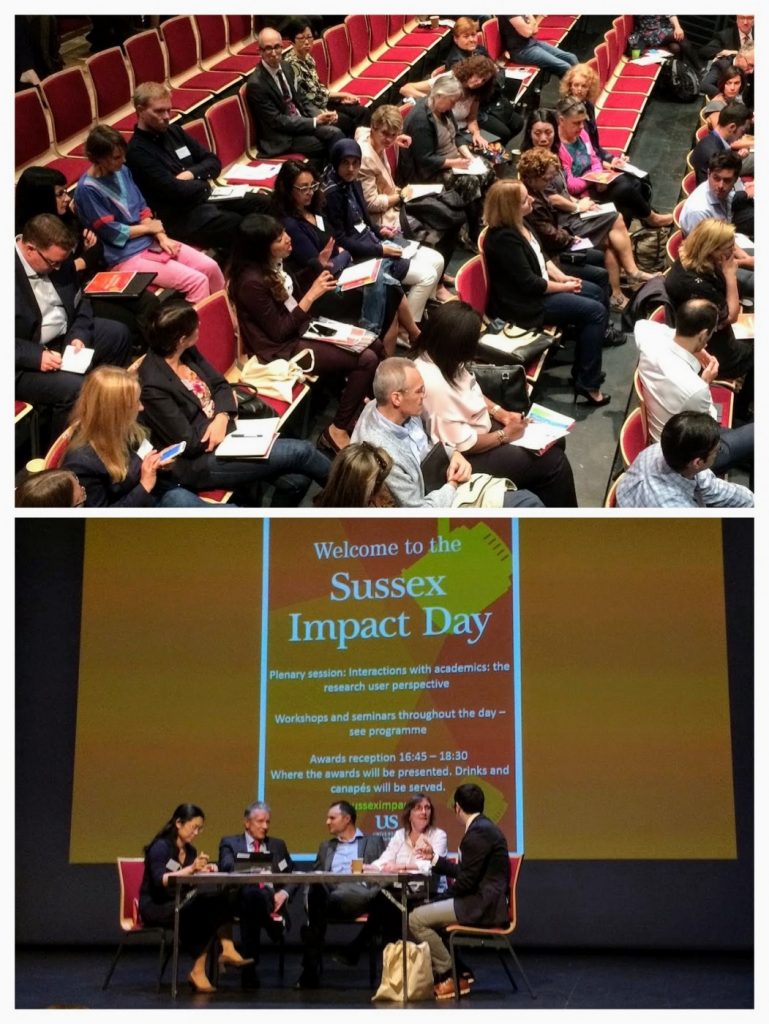
Images from the Plenary Session at the Sussex Impact Day
The University of Sussex Impact team also invited Dr Ferdinand to join other sessions at the Impact Day, including the plenary session featuring external organisations who have first hand experience of working with academics. The speakers were Mr Antonio Capillo, Senior Monitoring, Evaluation and Learning Manager at The Fairtrade Foundation, Ms Tao-Tao Chang, Research Grants manager at The Victoria and Albert Museum, Dr Penny Hawkins, Head of Research Animals Department at the RSPCA and Dr Malcolm Skingle, Academic Liaison Director at GSK.
For more on the Sussex Impact Day have a look at a summary of the day’s events and Dr Ferdinand’s session on Capturing Event Impacts on Storify.
HE policy update w/e 16th June 2017
New Parliament – On Monday we sent out a special edition policy update to keep you current on the political arrangements as the new government is formed. If you missed it you can read it here. Locally, all the incumbents were re-elected, meaning the whole of Dorset continues to be represented by Conservatives. A breakdown of the local MPs, the profile of their vote share, and current political interest areas is available here. It has now been confirmed that the Queen’s Speech and state opening of Parliament will take place on Wednesday 21 June. Since Monday’s update it has been confirmed that Jo Johnson remains in post as Universities Science Research and Innovation Minister. Anne Milton is the new Apprenticeships and Skills Minister. Locally Tobias Ellwood will move to the Ministry for Defence.
- Student voting preferences: YouGov’s post-election poll states that 64% of full time students voted Labour, 19% for Conservatives, 10% Lib Dems. For graduates Labour got 49% and Conservatives 32%.
- Effect of age: The survey states that young turnout was not as high as the media initially reported – 59% of 20-24 year olds voted. The survey highlights that age is a new dividing line in British politics. For every 10 years older a voter is, the likelihood they will vote Conservative increases.
- Effect of education: The survey reports that education is also an electoral demographic divide with support. In the recent election support for the Conservatives decreased the more educated a voter was, with the reverse for Labour and the Lib Dems. Age is a factor, the young have more qualifications than the old, however YouGov report even accounting for this the Conservatives still have a graduate problem.
Longitudinal Education Outcomes (LEO) data – The full longitudinal education outcomes (LEO) data was released this week. It shows graduate earnings and employment outcomes from 2014/15 taking data from the students graduating 1, 3 and 5 years before 2014/15. The methodological of how the data measured prior attainment has changed and ethnicity identifiers have been removed from the dataset for this release. LEO will be published alongside the Key Information Set on Unistats. Wonkhe ran a live LEO blog on release day (BU got a mention) and have an assortment of articles discussing the LEO findings as well as university rankings for each subject area. Polar data is available so comparison of the class effect on graduate earnings is possible even at a subject level. BU is generally positioned well within the LEO data, which is consistent with our DLHE outcomes data.
Gender pay gaps: Wonkhe reported on the first trial release of LEO data highlighting that the pay gap between women and men is visible from graduation. Wonkhe have explored this gender pay gap through the full LEO dataset released this week. Their new article identifies that, while the gender gap remains, subject area has an affect and where there are lower numbers of men than women on a subject, e.g. nursing, the men outperform the women’s pay by an even greater margin. The article questions whether universities are failing to prepare women to enter the most well-paying graduate jobs, and failing to encourage women’s aspirations on the same par as men. The article also anticipates that when the pay data can be cut by ethnicity that further gender racial divides will been seen. The Guardian also report on the gender pay gap.
Brexit – residency rights for EU citizens wishing to remain in the UK post Brexit are not as black and white as it seems. This report from Migration Watch UK on the EC’s negotiating position explores the shades of grey. There are ongoing rumours of pressure to soften the approach to Brexit but no indication of it – the formal negotiations with the EU start on Monday.
Higher Education and Research Act (HERA) – With Jo Johnson, Justine Greening and Greg Clark’s continuation of their cabinet roles the sector anticipates that both TEF and the HE and Research Act will move forward with more certainty now. UUK have published a briefing on the implementation of the Higher Education and Research Act 2017. UUK remain positive in their approach to the act whilst acknowledging the potential risk to institutional autonomy. The act replaces HEFCE with the OfS, establishes the combined UKRI, and begins to establish the new regulatory system for the sector. UUK call for universities to engage and influence how OfS and UKRI approach their remit and to consider the implications of these split bodies with reference to the relationship between teaching and research within universities.
Regulation: The sector will be regulated through the register of HE providers. The OfS can vary the conditions applied to providers (as the pool of providers will be wider) and requirements relating to access and participation. A technical consultation on registration fees is expected during autumn 2017. Student protection plans will be a requirement of registration, including transparency in enabling provision for student transfers. The OfS will consult on whether there are appropriate bodies that could perform quality assessment and data collection in advance of April 2018 and that would command the confidence of the sector.
Teaching quality: During amendment through parliament conditions of registration relating to quality and standards of teaching meant conditions should relate to sector recognised standards. The detail and ownership the sector will have over the definition of standards is unclear. However, amendments within the Lords ensured that ‘quality’ and ‘standards’ should be properly defined and separate and the independent ability of institutions to set their own standards was protected. The UK-wide standing committee on quality assessment is working to coordinate a shared regulatory baseline and is also reviewing how the quality code, including standards, may need to evolve in the context of the new regulations. HEFCE is also expected to conduct a review of the Annual Provider Review in the autumn.
Degree awarding powers: will be subject to independent quality advice from either the designated quality body or an independent committee, and replicates much of the role of the QAA’s Advisory Committee on degree awarding powers (Section 46). A consultation on how the OfS should exercise its new powers, including ‘probationary’ degree awarding powers, and the removal of degree awarding powers is expected. There are additional conditions to be met before OfS can vary or revoke degree awarding powers or university title, royal charters cannot be revoked in full. There is to be additional ministerial oversight of new providers without a validation track record. Amendment discussions secured tightened regulation around degree awarding powers and university title to protect both students and the sector reputation on sector entry for new providers.
Financial powers: OfS will have the ability to make grants or loans to a HE provider, replicating HEFCE’s powers to provider funding for high cost or strategic/vulnerable subjects. It’s likely any support for providers in financial difficulty would require DfE and Treasury input.
Fee limits & TEF: Fee limit changes require (active) approval by both Commons and Lords, even if the increase is below inflation. An approved access and participation plan is required. There are three levels of fee limits:
- the higher amount which will ordinarily increase by inflation (LINKED TO TEF)
- an intermediate cap LINKED TO TEF (but won’t be implemented before 2020)
- a basic cap (currently set at £9,000)
Until the academic year 2020/21 all providers participating in TEF with approved access plans will be permitted to charge the full inflationary increase up to the higher amount. Before differential fees determined by TEF rating can be implemented an independent review of TEF must take place. The review would need to take place in winter 2018/19 for differential fees to be implemented in 2020/21. The review will cover:
- the process by which ratings are determined under the scheme and the sources of statistical information used in that process
- whether process and statistical information are fit for purpose in determining ratings under the scheme
- the names of the ratings under the scheme and whether those names are appropriate
- the impact of the scheme on the ability of higher education providers to which the scheme applies to carry out their functions (including in particular their functions relating to teaching and research)
- an assessment of whether the scheme is in the public interest
- any other matters that the appointed person considers relevant
Subject level TEF have been delayed by an additional year but will be piloted in 17/18 and 18/19.
UKRI: will operate from April 2018 and is expected to commence by drafting its research and innovation strategy in collaboration with the sector. Research England will have to consult on the terms and conditions attached to the quality-related funding it provides. The government must publish details of the funding provided to UKRI, the terms and conditions attached, and the amount granted to each of the seven councils. This is designed to give public oversight of the process, and to encourage responsible allocation of funding to the different councils. The dual support system will not be undermined. The Act enshrines the Haldane principle within the legislation ‘decisions on individual research proposals are best taken following an evaluation of the quality and likely impact of the proposals (such as a peer review process)’. UKRI should give equal regard to all nations of the UK.
Widening Participation – The Social Mobility Commission have published the Social Mobility Barometer surveying the public’s attitude towards UK social mobility. The Barometer is new and there will be follow up polls each year until 2021. It was run by YouGov. Press coverage: BBC; TES focus on the belief education will be better in the future.
- 48% of the public believe that where you end up in society today is mainly determined by your background and who your parents are; 32% believe everyone has a fair chance to get on regardless of their background.
- 79% believe that there is a large gap between the social classes in Britain today.
- A large majority of people believe that poorer people are held back at nearly every stage of their lives – from childhood, through education and into their careers.
- 71% believe opportunity is dependent on where a person lives (something the government’s intended Industrial Strategy aims to tackle)
- Young people increasingly feel they are on the wrong side of a profound unfairness in British society. The report links this dissatisfaction with the recent election where record numbers of young people voted.
- Personal finances, job security and housing are key issues.
- 76% of the public say poorer people are less likely to attend a top university and 66% say poorer people have less opportunity for a professional career.
Fees and Funding
The House of Commons Library have published a clear briefing paper on HE funding in England. It covers the 2012/13 higher fee increase, removal of maintenance grants and student loan repayment threshold decisions. It also summarises the public spend on HE (within England) and the impact of student loans on the national debt.
Jane Forster Sarah Carter
VC’s Policy Adviser Policy & Public Affairs Officer
BU contributions to international midwifery conference 2017
Today sees the start of the triennial ICM (International Confederation of Midwives) conference in Toronto. BU is well represented in Canada through academics based in the Centre for Midwifery, Maternal and Perinatal Health (CMMPH) presenting posters, papers and workshops. The ICM programme can be accessed on line, click here!
 Over the next few days BU staff will present on a collaboration with the Anglo-European College of Chiropractic: ‘Newborn feeding clinic service evaluation: Midwives working in partnership with chiropractors to enhance breastfeeding experiences of mothers & babies in the UK’.
Over the next few days BU staff will present on a collaboration with the Anglo-European College of Chiropractic: ‘Newborn feeding clinic service evaluation: Midwives working in partnership with chiropractors to enhance breastfeeding experiences of mothers & babies in the UK’.
Dr. Rachel Arnold presents on her PhD research at Bournemouth University under the title ‘Ensuring high-quality respectful care in a climate of fear and intimidation’. On Wednesday Prof. Edwin van Teijlingen reports on the maternal mental health training conducted in Nepal in 2016-2017 under the title ‘Mental health training for community maternity workers in Nepal’. Dr. Jenny Hall is co-organiser of a symposium Spirituality and Childbirth with Prof. Susan Crowther and Dr. Celine Lemay.
Moreover there will be many BU poster presentations this week including ones by:
- Dr. Rachel Arnold and her PhD supervisors on ‘Women’s rights: the impact of management systems, managers’ practice and attitudes on midwives’;
- Dr. Alison Taylor and her PhD supervisors on ‘Early breastfeeding support for first-time UK mothers: A study based on video diaries’ AND a further posters on ‘Mothers need to talk, midwives need to listen: Insights from breastfeeding mother’s video diaries’;
- Sara Stride and Dr. Sue Way on ‘UUPP Study: Updating the Understanding of Perineal Practice at the time of birth across the United Kingdom’
- Prof. Vanora Hundley, Dr. Ann Luce (BU Faculty of Media & Communication), Prof. Edwin van Teijlingen and two students, Sofie Edlund and Sian Ridden, on ‘Changing the narrative around birth: midwives’ views of working with the media’;
- Profs. Vanora Hundley and Edwin van Teijlingen also contributed to a poster produced by Dr. Andrew Symon and colleagues from across the UK: ‘Midwifery-led antenatal care models: Mapping a systematic review to an evidence-based quality framework to identify key components and characteristics of care’.
Prof. Edwin van Teijlingen
Toronto, Canada












 UK Turing Scheme: My student mobility programme in Nepal
UK Turing Scheme: My student mobility programme in Nepal Bournemouth University psychologists publish new book
Bournemouth University psychologists publish new book Connecting Research with Practice: FoodMAPP Secondment in Austria and France
Connecting Research with Practice: FoodMAPP Secondment in Austria and France Health promotion paper read 8,000 times
Health promotion paper read 8,000 times The Beautiful Work Challenge: On Birth
The Beautiful Work Challenge: On Birth MSCA Postdoctoral Fellowships 2025 Call
MSCA Postdoctoral Fellowships 2025 Call ERC Advanced Grant 2025 Webinar
ERC Advanced Grant 2025 Webinar Horizon Europe Work Programme 2025 Published
Horizon Europe Work Programme 2025 Published Horizon Europe 2025 Work Programme pre-Published
Horizon Europe 2025 Work Programme pre-Published Update on UKRO services
Update on UKRO services European research project exploring use of ‘virtual twins’ to better manage metabolic associated fatty liver disease
European research project exploring use of ‘virtual twins’ to better manage metabolic associated fatty liver disease